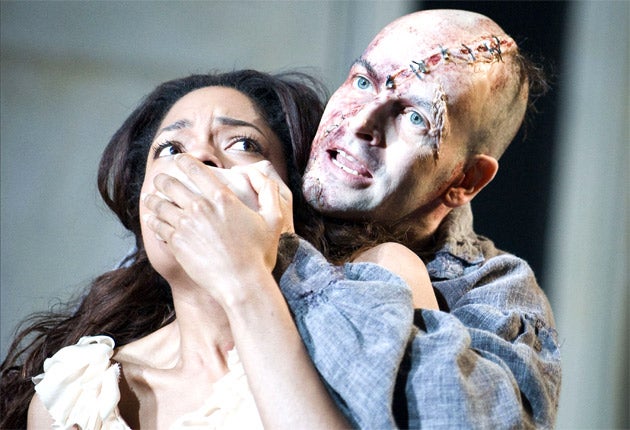First Night: Frankenstein, Olivier Theatre, London
Imaginative productions pack a devastating punch

Your support helps us to tell the story
From reproductive rights to climate change to Big Tech, The Independent is on the ground when the story is developing. Whether it's investigating the financials of Elon Musk's pro-Trump PAC or producing our latest documentary, 'The A Word', which shines a light on the American women fighting for reproductive rights, we know how important it is to parse out the facts from the messaging.
At such a critical moment in US history, we need reporters on the ground. Your donation allows us to keep sending journalists to speak to both sides of the story.
The Independent is trusted by Americans across the entire political spectrum. And unlike many other quality news outlets, we choose not to lock Americans out of our reporting and analysis with paywalls. We believe quality journalism should be available to everyone, paid for by those who can afford it.
Your support makes all the difference.Nick Dear's taut, fiercely focused version of Frankenstein – a project that has brought Oscar-winning film-maker Danny Boyle back to his theatrical roots – offers a radically different ending from either Mary Shelley's 1818 novel (on which it is based) or the movie versions spawned by James Whale's 1931 classic with Boris Karloff. Here, in a luminously ice-green Arctic, the scientist Victor Frankenstein and his Creature both survive, umbilically linked in the kind of perpetual deathly symbiosis that would pass muster in Dante's Inferno.
"He lives for my destruction. I live to lead him on," declares the Creature of his frost-bitten, exhausted maker who, even now, as he is fed raw fish to sustain him in his futile quest, recoils from the proffered hand of his abhorred progeny. This existential stalemate, brilliantly realised in script and production, projects an indelible multi-layered emblem – of a scientist who can only accept responsibility for what he has engendered by impotently seeking to un-invent it and of a rejected son who understands that this last-ditch mutual dependence is a bitter travesty of the human reciprocity he had desired.
As the pair made their final exit into the foaming ice-haze at the rear of the Olivier stage on Tuesday evening, one felt a weird, unprecedented combination of indefinitely postponed catharsis and real cliff-hanger suspense. How was this so? Because Danny Boyle's extraordinarily haunting production is predicated on the notion of alternating the two leading actors – Jonny Lee Miller (who played Sick Boy for Boyle in Trainspotting) and Benedict Cumberbatch – in the roles of Frankenstein and his galvanised handiwork. To get the full beauty of the concept, you would ideally (and with a deep enough pocket) see the production twice – which is why critics have been caught up this week in a miniature bout of Groundhog Day. Having trooped to the National for Frankenstein on Tuesday, we trooped to the National for Frankenstein all over again last night.
The first time round, it was the more intuitively "natural" casting of Cumberbatch (a dab hand at semi-comically preoccupied intellectuals – e.g. Sherlock Holmes) in cruelly distant, arrogantly self-involved boffin-mode as Frankenstein. No flat-topped, bolt-in-the-neck weirdo like Karloff, Jonny Lee Miller's astonishing Creature flops stark-naked, shaven-headed and grotesquely scarred through the vaginal flaps of Frankenstein's circular Leonardo-esque contraption as a latently beautiful man. A bare, forked organism with an amplified thumping heart, Lee Miller gives a whole new lease of life to the term "shock to the system" as he struggles to come to terms with the bewilderments of existence and with the unkindness of strangers in a flailing, straining L-plate biped's ballet of spasmodic convulsions and electrocuted sensitivity.
Dear's play may be called Frankenstein but we see the action – the Creature's education, his understanding of his spurned predicament through Paradise Lost (he should have been Adam but feels like the outcast Satan) and his revenge – predominantly from the point of view of this new, progressively disillusioned being. You could imagine a project where the alternative evening served a related but distinct play, this time written from the perspective of the Scientist. Here, though, it's the same text on both occasions and the same viscerally creepy settings and ambience – replete with a thrusting triangular chandelier that flares and frazzles like a synaptic storm, a revolve that opens up into an Alpine abyss, and a bell-rope in the central aisle that you can pull and set off a teeth-rattling toll.
The role-reversal makes deep thematic sense because it highlights the irony whereby the son becomes the father, the slave the master and a three-year-old creature ends up understanding more about love and the soul than the wannabe Prometheus who sparked him into being. Broadly speaking, Cumberbatch emphasises the intellectual edge of both roles; Lee Miller takes us further into the feeling. The latter superbly communicates the Creature's aching need for contact in the scene where Frankenstein tricks and torments him with the sight and touch of a beautiful Bride only to hack her to bits. Cumberbatch is brilliant at conveying the blackly ridiculous aspects of the hubristic Scientist.
No less virtuosic than Lee Miller in the ballet stakes, Cumberbatch is more horrifying as Frankenstein's handiwork and more assertive in argument. Both actors are transcendent at portraying, in the final scene, the dreadful poignancy of the frock-coated Creature's mock-courtly sliding between desperate need of Frankenstein (cradling him in a pieta) and skittish, suicidal goading of him. These are imaginative productions that pack a devastating cumulative punch and score a singular success.
Join our commenting forum
Join thought-provoking conversations, follow other Independent readers and see their replies
Comments